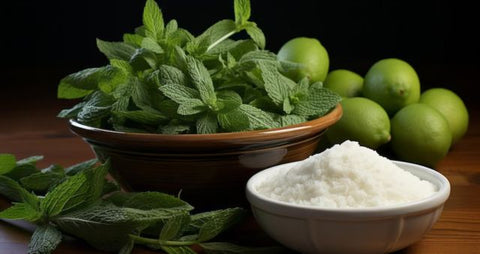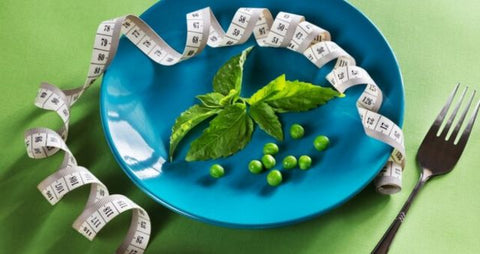From “Beta, meethe mein kya loge?” to “Kitna meetha khate ho?!” have we gone too far in doubting the sweetness we consume in our diet?
It’s unfair to solely blame sweetness for its bad reputation, which has largely resulted from the health risks associated with unhealthy sweeteners like those linked to type 2 diabetes and blood sugar imbalances. When it comes to natural sweeteners, stevia has consistently held its position at the forefront. But is its reputation truly deserved, or is it merely a myth?
Let’s dig into its depth!
In this blog, you’ll look at -
- What is stevia, and what is its origin?
- What makes stevia unique? Add other sugar
- 5 powerful health benefits of stevia
- How to use stevia as a substitute for sugar
- Are there any side effects to stevia?
- Is stevia safe to use during pregnancy?
- Some must-know facts about stevia
- Natural sugar substitutes other than stevia
- Frequently asked questions (FAQs)
What is Stevia, and What is its Origin?

Stevia is a natural sweetener that is extracted from the stevia leaves that are native to South America. The plant has been a source of sweetness for centuries. The leaves of stevia contain sweet compounds called steviol glycosides, which are sweeter than sugar but suffice in a small quantity. The glycoside compounds in stevia are heat-stable, pH-stable, and non-fermentable, making stevia the perfect natural sugar pick. What else sets stevia apart from other sweeteners?
What Makes Stevia Unique? Add other Sugar
Stevia sugar is a zero-calorie sweetener as the body doesn't metabolize its steviol glycosides. It's not only safe and tasty, but also healthy! Studies show that replacing sugar with stevia can lower blood sugar and cholesterol levels over time. Unlike artificial sweeteners like aspartame, neotame, and saccharine, which carry a risk of cancer or neurological disorders, stevia is a safer option. It's a natural sweetener recommended for diabetics!
Confused about making the switch? Here are stevia's top 5 health advantages!
5 Powerful Health Benefits of Stevia
1. It’s your calorie-free companion!
Did you know that stevia is completely calorie-free? It's because stevia contains steviol glycosides, its sweetening compounds. Due to their large and complex structure, they are harder for our bodies to absorb.
Health Benefits of Calorie-free Sweetness
Due to stevia's complexity and limited digestibility, it adds very few calories to our diet, making stevia sugar the right choice as a calorie-free sweetener. But is stevia good for diabetics?
2. The best natural sweetener for diabetics!
You guessed it right! Adding Stevia to your beverages, soft drinks, or desserts makes it the right choice for diabetics. Unlike added sugars that spike your blood sugar levels, stevia doesn’t contribute to diabetes. Instead, it offers tons of health benefits!
Health Benefits of Diabetic Sweetness
Unlike table sugar, stevia doesn't raise blood sugar directly, making it a valuable tool for managing blood sugar levels. Replacing sugar with Stevia can help reduce overall calorie intake, supporting weight management, a crucial aspect of diabetes control. Additionally, Stevia works well in a balanced diabetic lifestyle with a healthy diet, regular exercise, and medication adherence.
Related: 5 Reasons a Diabetic Should Switch to Natural Sugar
3. Supports your weight loss journey!

If you're looking for sweet treats without the "weight" of calories, Stevia is the ideal choice for weight loss! Being zero-calorie, it helps curb cravings for sugary foods due to its intense sweetness. Now, let's explore the health benefits it brings.
Health Benefits of Weightless Sweetness
While sugar contains about 4 calories per gram, stevia provides sweetness without adding any calories. This not only helps keep blood sugar levels in check but also aids in weight loss. Now, considering your utmost priority after physical health, it's your oral health. Artificial sweeteners often have a bad reputation for damaging oral health, but is stevia any different?
4. Take care of your oral health!
Stevia offers tons of oral health benefits. It's the complete opposite of refined sugar, which fuels bacteria leading to tooth decay. Stevia's antimicrobial properties prevent cavities and other tooth diseases. How else does stevia prove beneficial?
Health Benefits Cavity-free Sweetness
Stevia offers several benefits for oral health, making it a preferable substitute for sugary sweeteners. Studies indicate it inhibits the growth of Streptococcus mutans, a key contributor to cavities, potentially preventing plaque buildup and reducing the risk of cavities. Its negligible acid content prevents enamel erosion and tooth sensitivity. So, if you’re someone troubled with tooth sensitivity and affected by plaque buildup from white sugar intake, switch to stevia!
5. It Contains Anti-Inflammatory Properties!
Stevia has a compound called stevioside, which studies say has been found to have potential anti-inflammatory and antioxidant properties. But what are the benefits of its anti-inflammatory nature?
Health Benefits of Inflammation-free Sweetness
The anti-inflammatory nature of stevia plays a key role in reducing the risk of chronic diseases like cancer, Alzheimer's, and heart disease. Additionally, another stevia compound, rebaudioside A, exhibits antimicrobial properties that aid in the fight against harmful bacteria and viruses.
After learning about all the health benefits of stevia, you must be curious about how to effectively use it as the best sugar substitute in your diet. Don't worry; we have just the answer you're looking for!
How to Use Stevia as a Substitute for Sugar
These are the ways you can use stevia as your best substitute for sweetness.
Understanding Sweetness:
Stevia is much sweeter than sugar. A pinch of Stevia powder can equal 1 teaspoon of sugar, and 3–4 drops of liquid Stevia can equal 1 teaspoon of sugar. Start small and taste as you go to avoid over-sweetening.
Choosing the Right Form:
Powder: Great for baking and sprinkling on cereals or yogurt.
Liquid drops: are convenient for adding to drinks and sauces.
Packets: pre-measured for easy on-the-go sweetness.
In our daily lives, choosing the right sugar substitute with stevia can be tricky. Many brands claim natural benefits but hide potential side effects. That's where ‘Guud Sugar’ stands out! Modern science has blessed your health with its Ayurvedic and natural solutions.
Guud Sugar – your stevia-rich natural sweetener!
Made with stevia, Guud sugar is a natural sweetener blending Ayurvedic wisdom with plant power. It's as sweet as regular sugar but with only half the calories. ‘Guud Sugar’ adds flavor, supports a healthy immune system, and helps keep blood sugar levels steady. 'Guud sugar' is better than regular table sugar as it has a low glycemic index. It combines ancient Ayurvedic wisdom with modern science, prioritizing your overall well-being.
Here are the five unique features of ‘Guud Sugar’ that triple its ‘guudness’:
- It’s natural and has half the calories of refined sugar.
- It harnesses the power of modern technology and scientific knowledge.
- It’s rich in stevia.
- It contains Ayurvedic herbs and is enriched with vitamins and minerals.
- It offers the same sweetness as white sugar, but without jeopardizing your health.
- It’s free of artificial sweeteners.
Still, wondering how sweetness enriched with stevia can offer so much ‘guudness’?
Here is how you can use Guud Sugar to make your delicious, low-calorie dessert recipe:
Are There Any Side Effects to Stevia?
No, studies say Stevia doesn't have specific side effects. Many natural sweetener brands use Stevia, and “Guud Sugar” is one of the most reliable ones! Stevia is a natural sweetener that is safe to consume, derived from nature, and even safe to use during pregnancy!
Is Stevia Safe to Use During Pregnancy?
Yes, stevia is safe to use during pregnancy. It’s recommended for people who have type 2 diabetes or who are at risk of developing gestational diabetes when pregnant. Leading health groups such as the Academy of Nutrition and Dietetics and the American Diabetes Association support the safe use of low-calorie sweeteners during pregnancy. But what are the other facts about Stevia that make it unique?
Some Must-Know Facts about Stevia
After learning about how safe Stevia is, even for pregnant women, let's share some surprising facts about Stevia that you might find interesting:
-
Ancient Roots: The sweetening properties of stevia have been recognized for hundreds of years! It was traditionally used by the Guarani tribes of South America as a natural sweetener, and they referred to it as “ka’a he’ẽ,” which translates to “sweet herb.”
-
From Plant to Powder: The white powder form of stevia that we see in stores is not in its natural state. It’s derived from the leaves of the stevia plant, which is indigenous to Paraguay and Brazil.
- Natural Sweetness: The sweetness of Stevia is inherent! It’s not like artificial sweeteners; its sweetness is derived from steviol glycosides, unique compounds found in the Stevia plant.
But what are some natural sugar substitutes other than stevia that are similarly harmless and beneficial?
Natural sugar substitutes other than Stevia
Here’s a list of other sugar substitutes that are as harmless and beneficial as stevia.
- Allulose
- Monk Fruit
- Xylitol
- Agave
- Maple Syrup
Frequently Asked Questions (FAQs)
1) Is it safe to use stevia daily?
Yes, it is generally safe to use Stevia daily. Stevia leaf extract has always been considered a safe and healthy substitute for sugar. The Food and Drug Administration (FDA) and the World Health Organization have recognized steviol glycosides, which are refined extracts of stevia, as safe for daily consumption up to 4 mg per kilogram of body weight. However, it’s always a good idea to consult with a healthcare provider before making any major changes to your diet.
2) Is stevia recommended by doctors?
Yes, stevia is often recommended by health professionals as a safe and healthy sugar substitute. It’s particularly beneficial for those with diabetes, as it can help maintain healthy blood sugar levels. However, it’s always suggested to consult with your healthcare professional before making any major changes to your diet.
3) What forms of stevia are safe?
Stevia is available in several forms, but not all are approved by the FDA. The FDA recognizes purified stevia extracts, such as Reb A, as safe for consumption. These extracts are often found in commercial products. ‘Guud Sugar’ is one of the best stevia-rich sweet components that you can add to your diet.
4) What do dieticians say about stevia?
Dieticians often recognize stevia as a safe and healthy sugar substitute. It’s particularly beneficial for those looking to manage their weight or blood sugar levels, as it’s calorie-free and doesn’t impact blood sugar levels. However, like any food, it’s important to consume Stevia in moderation.
5) Does stevia have health benefits?
Yes, stevia has several health benefits. It’s a natural sweetener that doesn’t contribute calories or carbohydrates to the diet, making it a popular choice for weight management and blood sugar control. Additionally, stevia has been shown to have potential health benefits such as aiding in weight loss, lowering blood pressure, and preventing certain forms of cancer.
